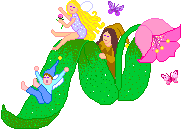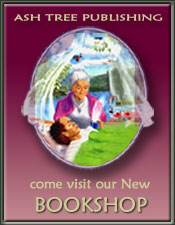Chronic Problems workshop with Susun Weed
By Karen Joy
Another gorgeous weekend for classes! This morning began with chilled oatstraw infusion.After parking, sitting in circle, and settling in with a nice cup of sister oatstraw, we passed the talking stick, sharing anything about us we wanted to, as well as anything related to "chronic problems" we would like addressed on this day. All the while, the resident geese, Loverboy and Sweetheart, squawked along (since it is only polite for them to speak WHILE others are).
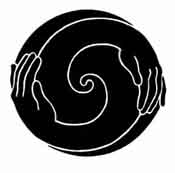 My biggest question was how to relate to people with chronic problems who keep asking for my ideas then don't want to follow them! I tend to lose patience sometimes and throw my hands in the air, when really I would like to stay in a caring space. The example I used was offering nettle infusion to my mother and her saying after one sip "I don't do bitter". Susun shared creative ideas to help people drink infusions -- like make them into ice cubes to drop into drinks, put infusions into soups, add to alcohol, sweeten them. Basically, what I heard Susun say is take the time to get to know the person and work with her or him to find an acceptable way to introduce something new into their daily routine. Having heard her talk about this before, I get she doesn't want us to focus on taking away from ourselves or others or to make drastic changes. She wants us to focus on adding nourishment, in doses we are ready for.
My biggest question was how to relate to people with chronic problems who keep asking for my ideas then don't want to follow them! I tend to lose patience sometimes and throw my hands in the air, when really I would like to stay in a caring space. The example I used was offering nettle infusion to my mother and her saying after one sip "I don't do bitter". Susun shared creative ideas to help people drink infusions -- like make them into ice cubes to drop into drinks, put infusions into soups, add to alcohol, sweeten them. Basically, what I heard Susun say is take the time to get to know the person and work with her or him to find an acceptable way to introduce something new into their daily routine. Having heard her talk about this before, I get she doesn't want us to focus on taking away from ourselves or others or to make drastic changes. She wants us to focus on adding nourishment, in doses we are ready for.
Other people shared their concerns for themselves and their loved ones. I cant' remember them all, but as I write this "memory" of class, I should remember some.
After circle, and before lunch, Susun answered some of the more general questions. Then she discussed the 3 traditions of healing and the 6 steps of healing. If you want me to elaborate more on these I can. There are many articles on the websites, pages in the books, and even posts on this forum that discuss this. They are essential to know, though, in order to address chronic problems, and to address steps one may have already taken before coming to us with the problem.
Something I don't think is written in Susun's books (but I believe may be on one of her websites) that was important to talk about were the questions to ask about herbs. Often we hear take this for that. Well, first, in the Wise Woman tradition we use herbs for people. We don't want to take something FOR a headache! We want something for the person with the headache!
 Secondly, we must ask certain questions about the herb suggested.
Secondly, we must ask certain questions about the herb suggested.
*What part of the herb should we use?
*In what stage of its life should it be collected?
*How should we prepare it?
*How much of it do we take?
These are very crucial questions! I want to use comfrey leaves, not roots, for infusions. Dandelion leaves are bitter once warmth hits, and its roots contain drastically different substances depending on when they are collected. Poke root tincture I would never take more than drops, yet echinacea tincture would probably be useless in a drop or two. Alcohol draws out the alkaloids in plants, while vinegar draws out the minerals. St. Joan's wort given to people dried in capsules caused light sensitivity, while tinctured fresh it causes no such problem. All my nourishing herbal infusions are from dried plant material for maximum benefit.

Soon we broke for lunch. Those of us who wanted to helped collect wild greens.(I love a class where lunchtime is just as much learning as any other time.) 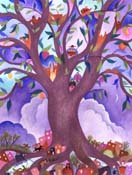 Chickweed was abundant, Yum!! We collected chickweed, wild madder (also called bedstraw), violet flowers, garlic mustard, winter cress flowers, dandelion flowers, catnip, wild oregano, plantain leaves, and maybe more I am forgetting. For soup we had nettles! double yum! One of the vinegars we had was garlic mustard root. Susun and the apprentices seem to try to choose the vinegars for that day that relate to plants we are learning. To help us, after lunch, we all got to smell the roots of new garlic mustard and that of one in flower. The first smelled deliciously horseradish-like, while the latter had lost much of this. Now I know to get them before flowering for my soon-to-be-made vinegar!
Chickweed was abundant, Yum!! We collected chickweed, wild madder (also called bedstraw), violet flowers, garlic mustard, winter cress flowers, dandelion flowers, catnip, wild oregano, plantain leaves, and maybe more I am forgetting. For soup we had nettles! double yum! One of the vinegars we had was garlic mustard root. Susun and the apprentices seem to try to choose the vinegars for that day that relate to plants we are learning. To help us, after lunch, we all got to smell the roots of new garlic mustard and that of one in flower. The first smelled deliciously horseradish-like, while the latter had lost much of this. Now I know to get them before flowering for my soon-to-be-made vinegar!
The nettle soup was just nettles cooked in water, the night before I think, and then left to infuse until reheated for lunch, for our best assimilation of its goodies. It was left completely unseasoned in part so we could see how yummy it was on its own. Then placed on the porch where we ate lunch were condiments we could add, like miso, tamari, vinegars, etc. It didn't need them, though I added miso for the extra nutrition. After lunch we got to visit a nettle patch and see how it looked as well as learn how it likes to be grasped firmly. When I touch her tentatively, afraid of her sting, I get "stung" (really there are hairs with acid at their base which fling onto my skin with my brush).

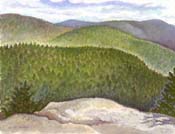 After lunch, we visited some plants often used with chronic problems and learned more about them. I really enjoy being able to visit them, see how they look, where they like to grow, and their various stages of growth. It also helps so much to learn about the plants' benefits for us while sitting with them.
After lunch, we visited some plants often used with chronic problems and learned more about them. I really enjoy being able to visit them, see how they look, where they like to grow, and their various stages of growth. It also helps so much to learn about the plants' benefits for us while sitting with them.
The plant that seems to stand out most for me is comfrey. She seems to be a particular ally for me and maybe my family.
Some of the things I remember hearing on this day:
 Mucous is our friend! It coats our soft tissue. It is a necessary part of our well-being. Without it, many chronic conditions are born. Comfrey leaf and mullein leaf infusions are two of many herbs that help us nourish mucous production in our bodies. If it seems we are overflowing with mucous it is our bodies' reactions to its lack. Susun showed us the positioning of the sinus cavities in our head and how its exits are up and over. If we are not producing enough mucous the bacteria that gets in there can produce infection. If we are producing enough, the bacteria that are a natural part of our lives, is able to continue moving through. Perhaps this is hard to explain written without a visual.
Mucous is our friend! It coats our soft tissue. It is a necessary part of our well-being. Without it, many chronic conditions are born. Comfrey leaf and mullein leaf infusions are two of many herbs that help us nourish mucous production in our bodies. If it seems we are overflowing with mucous it is our bodies' reactions to its lack. Susun showed us the positioning of the sinus cavities in our head and how its exits are up and over. If we are not producing enough mucous the bacteria that gets in there can produce infection. If we are producing enough, the bacteria that are a natural part of our lives, is able to continue moving through. Perhaps this is hard to explain written without a visual.
 Cayenne pepper is awful for IBS.
Cayenne pepper is awful for IBS.
 Acupuncture descriptions like stagnant blood is just metaphor for us westerners because true stagnant blood is death.
Acupuncture descriptions like stagnant blood is just metaphor for us westerners because true stagnant blood is death.
 Perhaps, instead of looking for an herbal alternative to drugs given to children who don't fit in school expectations (labeled ADD/ADHD), we could question the expectations for that particular child and find alternatives to the schooling. We don't (well I don't) want to use herbs as drugs to control behavior, only to nourish health, or to help bring a body to a place where we can nourish health.
Perhaps, instead of looking for an herbal alternative to drugs given to children who don't fit in school expectations (labeled ADD/ADHD), we could question the expectations for that particular child and find alternatives to the schooling. We don't (well I don't) want to use herbs as drugs to control behavior, only to nourish health, or to help bring a body to a place where we can nourish health.
 Calcium supplements encourages brittle bones. We want to get calcium from whole herbal sources, like nourishing infusions and herbal vinegars.
Calcium supplements encourages brittle bones. We want to get calcium from whole herbal sources, like nourishing infusions and herbal vinegars.
 All allergies are an allergy to life (aka. protein -- the building block of life). An affirmation one with allergies can say, goes something like "I deserve to be here. I deserve to have what I need." (Unfortunately, I can't remember word for word what Susun said).
All allergies are an allergy to life (aka. protein -- the building block of life). An affirmation one with allergies can say, goes something like "I deserve to be here. I deserve to have what I need." (Unfortunately, I can't remember word for word what Susun said).
 Re. the question "Why st. joan's wort instead of st. john's wort?" One way Christianity has influenced us is to take away our natural time by the moon and sun. This is done by replacing holidays with their own, set a few days late or early. Examples are Christmas, several days after winter solstice, and st. john's day (catholic?) several days off summer solstice. Changing the name reclaims summer solstice and our timing, the time when this herb, hypericum perforatum, likes to bloom. Joan was burned for talking directly to god. Using her name we reclaim our direct connection with divine life. St. joan's wort oil is an excellent salve for soothing sunburn and to prevent sunburn, who would know more about burns than Joan?!
Re. the question "Why st. joan's wort instead of st. john's wort?" One way Christianity has influenced us is to take away our natural time by the moon and sun. This is done by replacing holidays with their own, set a few days late or early. Examples are Christmas, several days after winter solstice, and st. john's day (catholic?) several days off summer solstice. Changing the name reclaims summer solstice and our timing, the time when this herb, hypericum perforatum, likes to bloom. Joan was burned for talking directly to god. Using her name we reclaim our direct connection with divine life. St. joan's wort oil is an excellent salve for soothing sunburn and to prevent sunburn, who would know more about burns than Joan?!
Oh I know there is so much more we learned in class. A beautiful day with the goats, the geese, the plants, the women, and many other facets of life!!
karen joy
nourishing wholeness anywhere

Healing
Wise
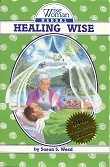 by Susun
S. Weed
by Susun
S. Weed
Introduction by Jean Houston.
Superb herbal in the feminine-intuitive mode. Complete instructions for using common plants for food, beauty, medicine, and longevity. Seven herbs -- burdock, chickweed, dandelion, nettle,
oatstraw, seaweed, and violet -- are explored in depth.
A Special Tenth Anniversary edition of this
classic herbal, profusely illustrated. 312 pages.
Retails for $21.95
Read a Review
Order HEALING WISE in our Bookshop
I just started reading your book, Healing Wise. Your
humor and approach to life seem so "down-to-earth",
just like your favorite powerful weeds. Thank you for sharing
and nourishing! ~ Diane
A
City Herbal
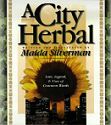 by Maida Silverman. The wild plants of the city are
potent herbal medicines and nutritious wild edibles, as
well as sources of comfort, fiber, and dyes. Learn to recognize
and use 34 of them. 192 pages, index, illustrations.
by Maida Silverman. The wild plants of the city are
potent herbal medicines and nutritious wild edibles, as
well as sources of comfort, fiber, and dyes. Learn to recognize
and use 34 of them. 192 pages, index, illustrations.
Read an article: Mullein
Read a Review
Retails
for $13.95
“A City Herbal by Maida Silverman is a delightful way to get acquainted with wild herbs that you have no doubt walked on or over without ever dreaming how useful they can be. It has increased my interest and curiosity a hundredfold and I’m sure it will do the same for you.”
-James Beard







